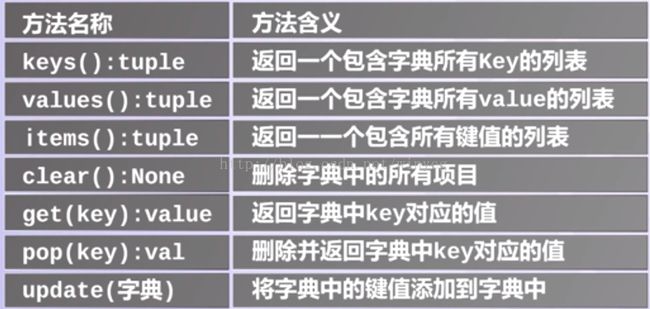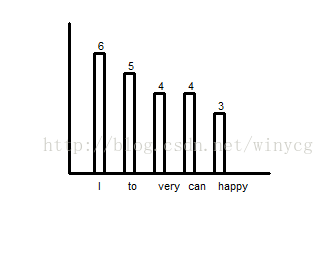Python字典详解
字典:键值对的集合,该集合以键为索引,同一个键对应一个值,为一个容器类型
举例:检索学生或员工信息
<键><值>对 键(身份证号码) 值(学生信息)
字典操作:
创建字典:
>>> ainfo={'qw':12,'er':34}
>>> binfo=dict([('qw',12),('er',12)])
>>> cinfo=dict([['qw',12],['er',12]])
>>> dinfo=dict(name='Bill',age=56)
>>> ainfo
{'qw': 12, 'er': 34}
>>> binfo
{'qw': 12, 'er': 12}
>>> cinfo
{'qw': 12, 'er': 12}
>>> dinfo
{'name': 'Bill', 'age': 56}初始化字典:
>>> #fromkeys第一个参数是序列类型
>>> aDict={}.fromkeys(('ycg','sx'),30)
>>> aDict
{'ycg': 30, 'sx': 30}
>>> sorted(aDict)
['sx', 'ycg']使用两个列表创建
a=['qw','rt','yu']
b=['zx','cv','nm']
fdict=dict(zip(a,b))
print(fdict)添加项: students["2017"]="qwe"
删除键值对:del students["2017"]
遍历字典:
for key in students:
print key+','+students[key]
遍历字典的键:
for key in students.keys():
print key
遍历字典的值:
for value in students.values():
print value
遍历字典的项:
for item in students.items():
print item
判断键是否
在字典中:in/not in,返回True或者False
字典作为函数的参数:
>>> def f(arg1,*argt,**argd):
print(arg1)
print(argt)
print(argd)
>>> f('q','qq','ww',a1=1,a2=2)
q
('qq', 'ww')
{'a1': 1, 'a2': 2}字典方法:
字典实例一:查询英文文章中出现字数前5多的单词并以图表形式输出
输入用例:article.txt文件:
don't know what I do now is right, those are wrong, and when I finally Laosi when I know these. So I can do now is to try to do well in everything, and then wait to die a natural death.Sometimes I can be very happy to talk to everyone, can be very presumptuous, but no one knows, I can make him very happy very happy, but couldn't find the source of happiness, just giggle.
# -*- coding: utf-8 -*-
from math import *
from turtle import *
wordcounts={}#用字典存储单词的数量
countwords = []#将字典中的键值反转存入列表,便于排序
count=5
xscale=30#x轴放大倍数
yscale=20#y轴放大倍数
xlabel=[]#存储单词,用于x轴显示
ylabel=[]#存储单词数量,用于y轴显示
#句子中的标点符号替换为空格
def replacepunctuations(line):
for ch in line:
if ch in ",.;'":
line=line.replace(ch,' ')
return line
#处理每一行并更新字典
def processline(line):
words=replacepunctuations(line).split()
for word in words:
if word in wordcounts:
wordcounts[word]+=1
else:
wordcounts[word]=1
#(x1,y1)到(x2,y2)画一条线
def drawline(t,x1,y1,x2,y2):
t.penup()
t.goto(x1,y1)
t.pendown()
t.goto(x2,y2)
#在(x,y)上标注文本
def drawtext(t,x,y,text):
t.penup()
t.goto(x,y)
t.pendown()
t.write(text)
#画条状图
def drawbar(t,x,y,text):
x=x*xscale
y=y*yscale
drawtext(t,x,y,y/yscale)
drawtext(t,x,-20,text)
drawline(t, x - 5, 0, x - 5, y)
drawline(t, x - 5, y, x + 5, y)
drawline(t, x + 5, y, x + 5, 0)
def drawgraphy(t):
drawline(t,0,0,200,0)
drawline(t,0,0,0,150)
for i in range(0,count):
x=i+1
drawbar(t,x,countwords[i][0],countwords[i][1])
def main():
f = open("article.txt", "r")
for line in f:
processline(line)
print wordcounts
xlabel = wordcounts.keys()
ylabel = wordcounts.values()
#键值反转并排序
for [y, x] in wordcounts.items():
countwords.append([x, y])
countwords.sort()
countwords.reverse()
p=Turtle()
p.pensize(3)
p.hideturtle()
drawgraphy(p)
done()
main()输出:
字典实例二:
文件合并实例:
TelInformation.txt
姓名: 电话:
嘻嘻 1333333
男男 82782
EmailInformation.txt
姓名: 邮箱:
嘻嘻 [email protected]
东东 [email protected]
Information.txt
嘻嘻 1333333 [email protected]
男男 82782 not have email
东东 not have tel [email protected]
# -*- coding: utf-8 -*-
from math import *
from turtle import *
def main():
f1=open("TelInformation.txt","r")
f2=open("EmailInformation.txt","r")
f3=open("Information.txt","w")
f1.readline()
f2.readline()
lines1=f1.readlines()
lines2=f2.readlines()
dicttel={}
dictemail={}
list=[]
for line in lines1:
information=line.split()
dicttel[information[0]]=information[1]
for line in lines2:
information = line.split()
dictemail[information[0]] = information[1]
for line in dicttel.keys():
if line in dictemail:
list.append(line+' '+dicttel[line]+' '+dictemail[line]+'\n')
else:
list.append(line + ' ' + dicttel[line] + ' not have email\n')
for line in dictemail.keys():
if line not in dicttel:
list.append(line + ' ' + ' not have tel'+dictemail[line]+'\n')
f3.writelines(list)
f1.close()
f2.close()
f3.close()
main()
